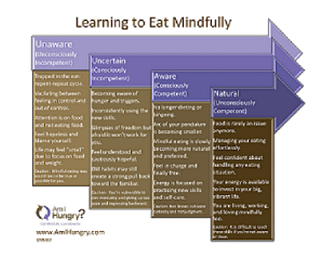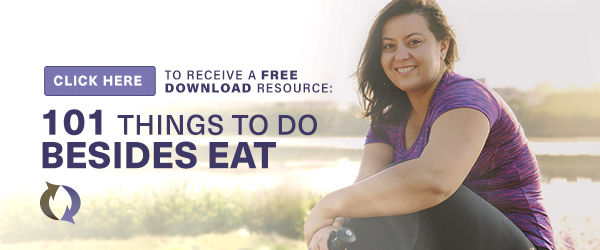One of the questions I am often asked is, “How long does it take to learn to eat mindfully and stop yo-yo dieting (or whatever the challenge is)?” My answers are: “It depends,” “It’s a process,” “It’s different for each person,” or “I’m still learning!” However, after more than 20 years of teaching mindful eating using the Mindful Eating Cycle, I’ve noticed that people who are learning to eat mindfully go through four distinct phases that closely follow a learning model called the Four Stages of Learning.

Briefly, here are the Four Stages of Learning, then I’ll talk specifically about how people move through these stages as they learn to eat mindfully. (Please note: Don’t get hung up on the word “incompetent.” It simply means you lack knowledge and/or a particular skill. It is not a judgment!)
- Unconsciously Incompetent – You don’t know what you don’t know (or don’t understand the value).
- Consciously Incompetent – You know what you don’t know but your awareness may outpace your skills.
- Consciously Competent – You are practicing what you want to know.
- Unconsciously Competent – It is, or has become, natural for you so it is generally effortless.
When a person progresses through each of these stages as they learn to eat mindfully, there are common patterns in the following areas (as well as common pitfalls in each stage). Click here or on the graphic to enlarge.
- Your relationship with food
- Your eating behaviors
- How you feel
- Where you invest your energy and attention
- What your life looks like
Four Stages of Learning to Eat Mindfully
Unaware (Unconsciously Incompetent)
At the Unaware stage, you either don’t realize there’s an alternative to repeated dieting or you’ve heard about mindful eating and don’t understand how it could help you (or don’t believe that it could).
- You feel trapped in the eat-repent-repeat cycle.
- You tend to vacillate between feeling in control and feeling out of control.
- Your attention is often on food (and not eating food).
- You may feel hopeless about your struggles with food and blame yourself.
- Your life may feel “small” due to your excessive focus on food and weight.
Caution: At this stage, mindful eating may sound too good to be true. In addition, there are many myths about mindful eating that could confuse or discourage you from taking the next step.
Uncertain (Consciously Incompetent)
At the Uncertain stage, your awareness of mindful eating is increasing faster than your skills. As a result, you may feel afraid that mindful eating won’t work for you. However, mistakes are an important part of the learning process.
- You are learning to recognize the decision points in the Mindful Eating Cycle, including awareness of hunger and other cues for eating.
- You are inconsistently using your new mindful eating skills.
- You may have glimpses of freedom from your old patterns, but still feel afraid it won’t work for you in the long run.
- You finally feel understood and cautiously hopeful because you realize that others have had similar struggles.
- Your old habits may still create a strong pull back toward familiar patterns.
Caution: Out of habit, you may try to apply old “diet-mentality” to mindful eating, for example, using hunger and fullness to control your eating, looking for quick results, focusing on whether you’re losing weight, or worrying about whether you’re doing it “right.” This is a time when you are vulnerable to giving up and regressing back to unconscious incompetence. A workshop, retreat, coach, or therapist can be invaluable for guiding you toward competence.
Aware (Consciously Competent)
When you reach the Aware stage, you feel free of the bondage that dieting and overeating had on you. As you continue to practice your mindful eating skills, they become increasingly natural. At this point, you could learn how to teach others while you continue to increase your own awareness and master your new skills.
- At this point, you are no longer dieting. Binge eating has significantly or completely stopped.
- You are less prone to the extremes of restricting and overeating, so the arc of your pendulum is becoming smaller.
- Mindful eating is slowly becoming more natural and preferred.
- You feel in charge of your decisions about eating and finally free of the eat-repent-repeat cycle.
- You now have more energy to focus on practicing your new skills and meeting your self-care needs.
Caution: At this point, you can’t “unknow” mindful eating because you’ve personally experienced the benefits. However, you can choose to not do it. Mindful eating is not a linear process so you must continue to cultivate curiosity and nonjudgment.
Natural (Unconsciously Competent)
When mindful eating becomes natural, you manage your eating effortlessly using mindful eating principles: presence, awareness, curiosity, nonjudgment, and acceptance. You are more mindful in other aspects of your life, including your work and your relationships. Your energy is available to invest fully in your life.
- Food is rarely an issue for you anymore anymore.
- You are managing your eating effortlessly now.
- You feel confident about handling any eating situation that may show up.
- Your energy is available to invest in your big, vibrant life.
- You are living, working, and loving mindfully too.
Caution: It is difficult to teach these skills until you become aware of what they are. If you have always eaten mindfully or instinctively and have never been “incompetent,” it may be challenging for you to “get” why others struggle. If you feel drawn to help others with lifestyle change, you must become consciously competent by learning the specific strategies that seem so effortless and obvious to you.
No matter how long it takes to learn to eat mindfully or which stage of the process you are in, we’d love to help you get to your next level!
This article has been updated from a previously published version.
Enjoyed this article? Here are three more to help you:
What is the difference between Am I Hungry? and intuitive eating or HAES?
Mistakes are normal when learning to eat mindfully!
How to Make Sense of Your Eating Issues

